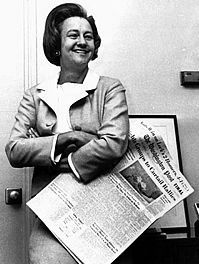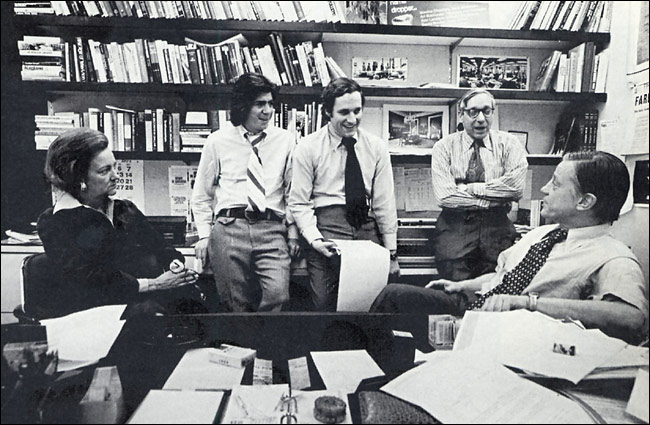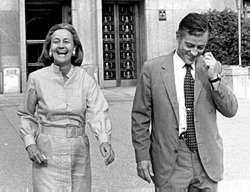Katharine Graham of The Washington Post
By Ben Bradlee The Washington Post
Katharine Graham's first leadership moment for me will always be her decision in 1963 to take the future of The Washington Post into her own hands after the tragic loss of her husband. Many of the world's leading newspaper owners were circling National Airport just waiting for an invitation to land and talk to her about buying her newspaper.
But after that, her first decision that required enormous  courage that I can remember was her approval of the landmark legal defense that the Washington Post lawyers had crafted to answer a subpoena by Vice President Spiro T. Agnew for all the documents we had supporting stories that eventually cost Agnew his job. We called it the Gray-Haired Grandmother Defense.
courage that I can remember was her approval of the landmark legal defense that the Washington Post lawyers had crafted to answer a subpoena by Vice President Spiro T. Agnew for all the documents we had supporting stories that eventually cost Agnew his job. We called it the Gray-Haired Grandmother Defense.
All reporters' notes relating to Agnew became Katharine's personal possessions, and asserting that she had ultimate responsibility for the custody of the notes, not the reporters. As Joe Califano put it, "It would be easy to put Cohen and Whitcover in jail; let's see if they have the guts to put a gray-haired grandmother in the slam."
She was perfectly willing to go.

Graham meets with Carl Bernstein, Bob Woodward, Howard Simons and Ben Bradlee.
Not too long after that, Katharine had her own great moment of courage in connection with the Pentagon Papers. You've heard Arthur Sulzberger's talk about Punch's courage, and it took a lot. But when the Post finally got their own copies of the Pentagon Papers five agonizing days later -- talk about courage, just waiting five days was courage -- after the Times had been enjoined from future publication, she was faced with her own dilemma. Her lawyers were telling her that we couldn't publish because a federal judge had already found that the New York Times, in the New York Times case, the Pentagon Papers did in fact represent a threat to national security. We historians countered that we couldn't let a New York judge decide what a Washington paper was going to print, and Katharine "Just Call Me Leadership" Graham backed her editors.
"Katie Graham's going to get her tit caught in a big fat wringer if that's published."
Then, soon after that, Katharine received the infamous threat from Attorney General Mitchell who screamed over the phone to Carl Bernstein "All that crap you're putting in the paper, it's all been denied. Katie Graham's going to get her tit caught in a big fat wringer if that's published. Good Christ, that's the most sickening thing I ever heard." I bet some of you forgot that, the full glory of that quote. Can you imagine any other, never mind Attorney General, in the last thirty years talking like that? That's the most sickening thing I ever heard.Finally, of particular interest to this audience came the awful pressman's strike in October 1977, more than a year after Watergate. I don't know how many of you ever saw the pictures of the damage done to the Washington Post pressroom that night -- rollers slashed, Coke bottles thrown into the gears, fire started in the reel room, and fire extinguishers - fire extinguisher hoses cut to render them useless. They put us out of business.
Katharine's decision was to get another edition on the streets as soon as possible and keep them coming for the next four-and-a-half months. Four-and-a-half months.
 Few of her fellow publishers, especially those in smaller metropolitan areas, thought that this woman, whose pressroom was only a few blocks from the headquarters of the AFL-CIO, and she was probably the least experienced publisher any of them knew, few of them thought she would risk a strike. And let's face it, few of them thought that Katharine Graham had the guts and leadership to pull it off. A liberal Democrat; a friend of labor leader George Meany; Georgetown social leader; blah-blah-blah, and only a woman to boot.
Few of her fellow publishers, especially those in smaller metropolitan areas, thought that this woman, whose pressroom was only a few blocks from the headquarters of the AFL-CIO, and she was probably the least experienced publisher any of them knew, few of them thought she would risk a strike. And let's face it, few of them thought that Katharine Graham had the guts and leadership to pull it off. A liberal Democrat; a friend of labor leader George Meany; Georgetown social leader; blah-blah-blah, and only a woman to boot.
You could see the sadness and discouragement in Kay Graham's eyes, but you could also see her jaw tighten with determination to get a paper out. Somehow, maybe in a couple of days. Then another, and another, and finally that determination put us back in business stronger than ever.
If her jaw hadn't been set, nothing would have happened.
Like I always say, no editor, no reporter, no publisher, can ever match the power and determination of an owner. Ladies and gentleman, Mother Courage herself, Katharine Graham.
This was a "leadership moment" presented at the ASNE Convention April 3, 2001, at the J.W. Marriott Hotel in Washington, D.C.
